Lulu Wang Breaks Down the 'Expats' Finale
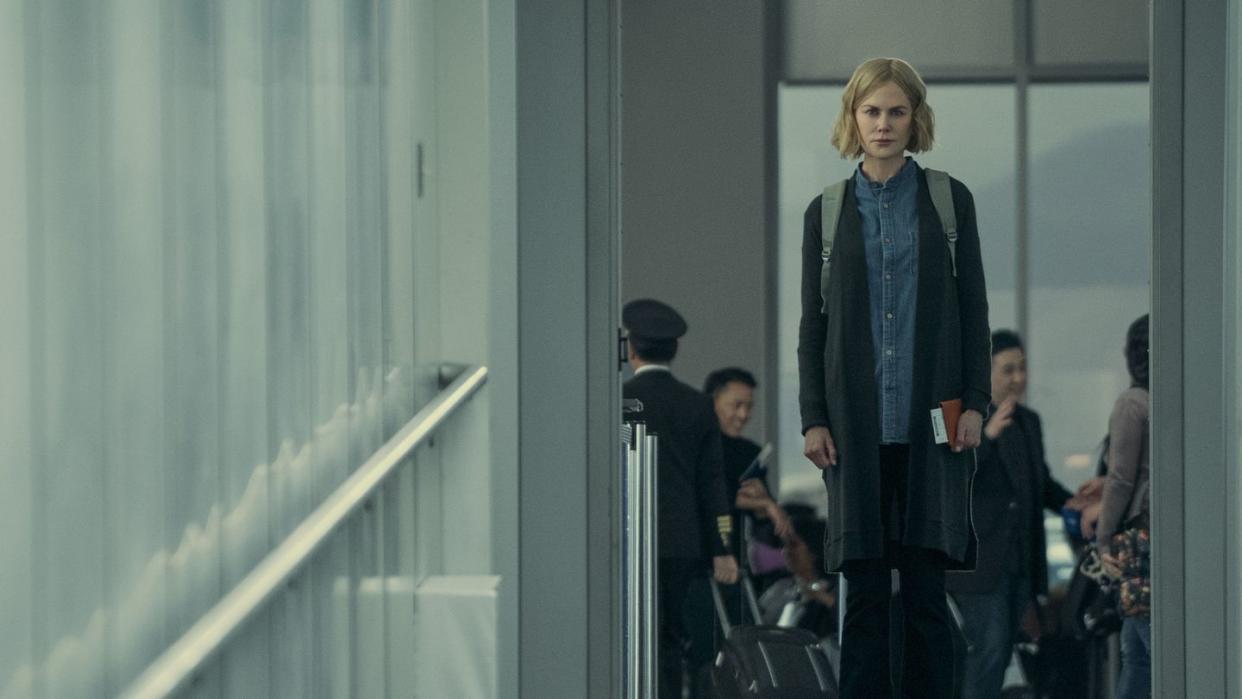
- Oops!Something went wrong.Please try again later.
- Oops!Something went wrong.Please try again later.
Spoilers ahead.
Lulu Wang’s first foray into TV, Expats, ends with Nicole Kidman’s Margaret roaming the streets of Hong Kong alone, unable to get on the plane with her family and leave the city where her son Gus vanished. Mercy (Ji-young Yoo), the woman responsible for Gus’ disappearance, is finding her own way of starting over: an unplanned pregnancy that finally allows her to seek solace in her harsh immigrant mother. She’s carrying the child of Hilary’s (Sarayu Blue) estranged husband, though Hilary is more preoccupied by the death of her abusive father, trying to make sense of his second family who seem to have been shielded from his toxic behavior.
Family—specifically the complicated identities and responsibilities of mothers and daughters—is at the core of the Prime Video series, and in the season finale “Home,” each woman contends with the idea of closure and what it means to move on after tragedy. Directed by Wang, “Home” features close-ups that she describes as a “visual representation of a diary,” in which each woman monologues about forgiveness, loss, and the meaning of home, though it’s unclear who exactly they are addressing.
The cinematic approach provides intimacy while also keeping their interpersonal relationships somewhat ambiguous before sending them all off on new journeys. “There is no miracle that can reset everything,” Mercy’s final voiceover says as Margaret’s tall blonde stature sticks out on the streets of Hong Kong, leaving viewers with the show’s lingering thesis statement. “You must hold the pain and keep on living.”
Ahead, Wang talks to ELLE.com about arriving at this conclusion, filming in Hong Kong during the pandemic, and adapting this story from book to series.
Expats is based on the 2016 novel by Janice Y.K. Lee. What made this the right project to follow your film, The Farewell?
Nicole [Kidman] brought me the book and said that it was something she was interested in adapting for television. I read the novel and felt like it had all of the seeds for themes that I was interested in. It was the intersection of so many different types of people with different backgrounds; the intersection of race, class, gender and privilege; and also it was a book about women, resilience, grief, and ambiguous loss. So there were many things that I felt like I hadn’t seen a lot of and it was a really rich playground to do a lot of deep character work.
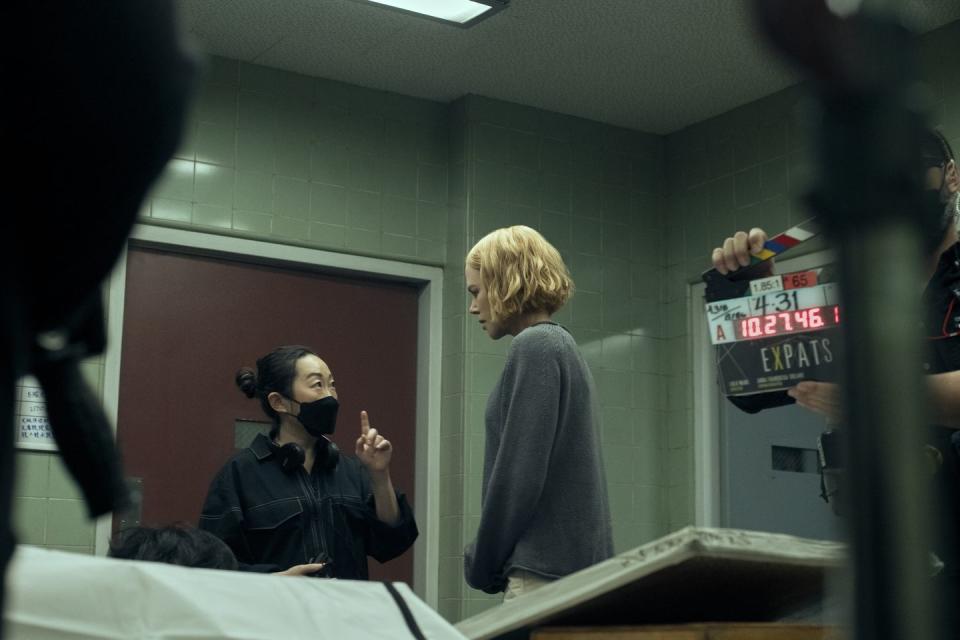
Motherhood as womanhood, grief, and guilt are the overarching themes of the story. What was it about these ideas that made you interested in exploring them over six episodes?
We started the project before the pandemic, and I was drawn to these themes even before. But then as we were making this series, it brought to the surface so many things that people were dealing with—especially in terms of ambiguous loss and how to cope. So in a way, it’s a meditation on how people are resilient. One of the questions that the incredible writers that I worked with in the writers room asked every day was, “How is this a decision to either fight or endure?” For every character—whether that’s Margaret, Mercy, Hilary, or even Hong Kong as a character—in the face of immense change of so many things outside of our control, do you choose to fight or endure? Both of those options are forms of resilience in their own right. But it was just something that we kept asking and I wanted to continue to challenge people’s empathy as we watch these different characters make choices under challenging circumstances.
Tell me about your choice to change Hilary’s stance on motherhood, which seems to be the one that departs most drastically from the book.
We talked about it in the writers room because there were women who didn’t ever want to become mothers or weren’t interested in becoming mothers in the traditional way of having their own children biologically or [through] adoption. We felt like it was a perspective that wasn’t commonly explored—the uncertainty around it, navigating questions from the community, family and friends, and the assumptions that people make. It’s interesting because I think a lot of people, even after watching the series, will say, “Oh, she’s dealing with infertility issues,” and I’d say, “You should watch the show again.” She’s trying to understand her own decisions and listen to her own voice rather than what society expects of her. I felt like that was a perspective that was underrepresented and it’s definitely something that Sarayu and I spoke about as well, as she’s somebody who has chosen not to have children. It’s funny when life imitates art.
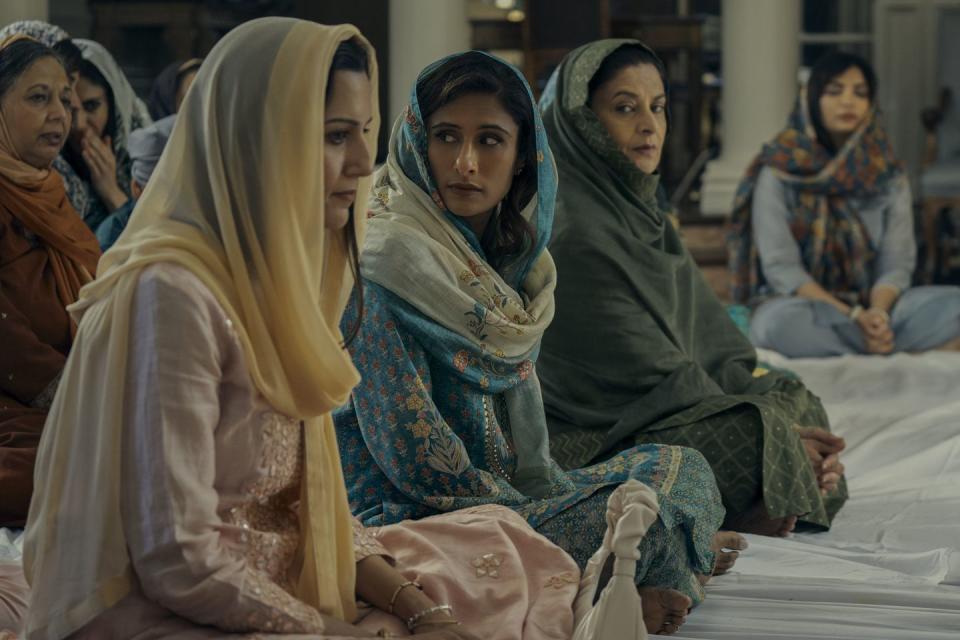
I also love the changes you made to Hilary’s backstory, imbuing it with cultural specificity and taboos like domestic violence. Where did those ideas stem from?
We brought Gursimran Sandhu into the room and she’s an incredibly funny, astute writer. She had a lot of personal stories and personal problems, like we all do, that she’s never had the chance to explore. So I just knew that she was going to have a lot of specificities to bring to this character. I wanted [Hilary to be] dark skinned in an East Asian country and to represent that amongst a wealthier class. I felt that it was going to be interesting that when she goes home, it’s not to India, but it’s to California. It’s another kind of American story, and Gursimran brought and put a lot of herself into this character.
You mention Hong Kong as a character in the story and it’s the setting for the series, though the bulk of the action is in this insular expat community. Why do you think that made for a rich setting?
It is the intersection of so many different types of people: financial, class, race, etc. It also has a rich intersection of cultures and its own story of resilience with the changes that it’s faced over the years. Hong Kong asks the questions of, “Who am I? Who do I belong to? Can I belong to myself?” It felt very much in line with the themes that I was exploring with all of the women in the show.
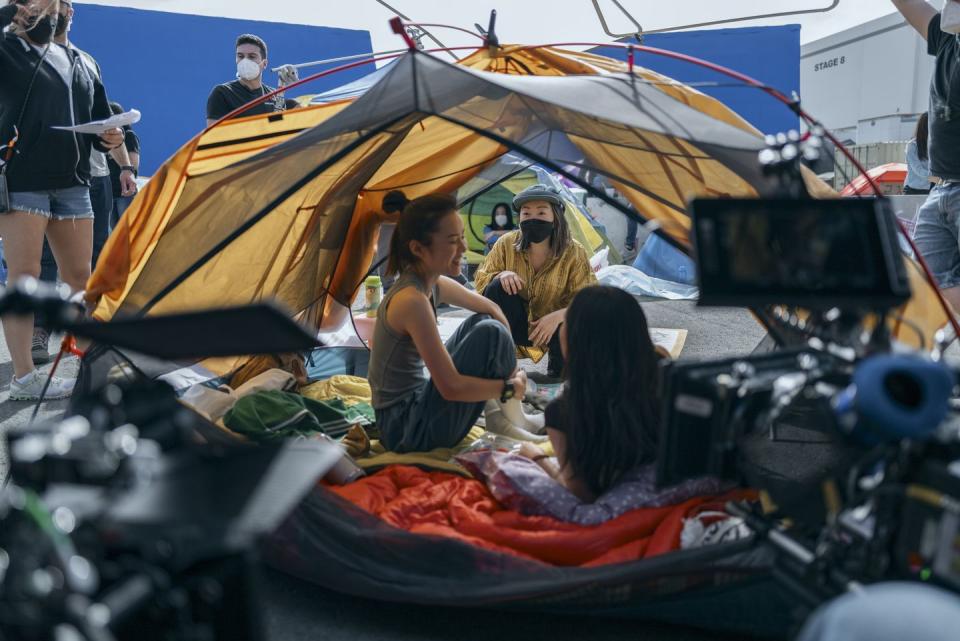
What were your favorite things about the production and what was your biggest challenge in bringing this story to life?
We all lived many lives making this show. It took such a long time to make it and we all lived with these characters in Hong Kong during a moment when no one was traveling there when the borders were closed because of the pandemic. We were in a bubble. What I loved about that was that we created a family: We had so many ups and downs but we were all in it together. There was a real camaraderie and we all faced production challenges that we’d never dealt with before: building huge sets on stages that had to be rained on, or working with visual effects for the first time on a scale like this. Coming through those challenges together gave us a lot of confidence in our filmmaking for me and all of my department heads.
We were thrown so many different challenges, from the pandemic to the strikes, international travel to a place that had to close its borders, and bringing people from all different parts of the world to this one place. The magnitude was the challenge, and trying to keep the heart of the whole series in mind as we were having to deal with all of these issues and making sure we were protecting the soul of why we wanted to make this project in the first place.
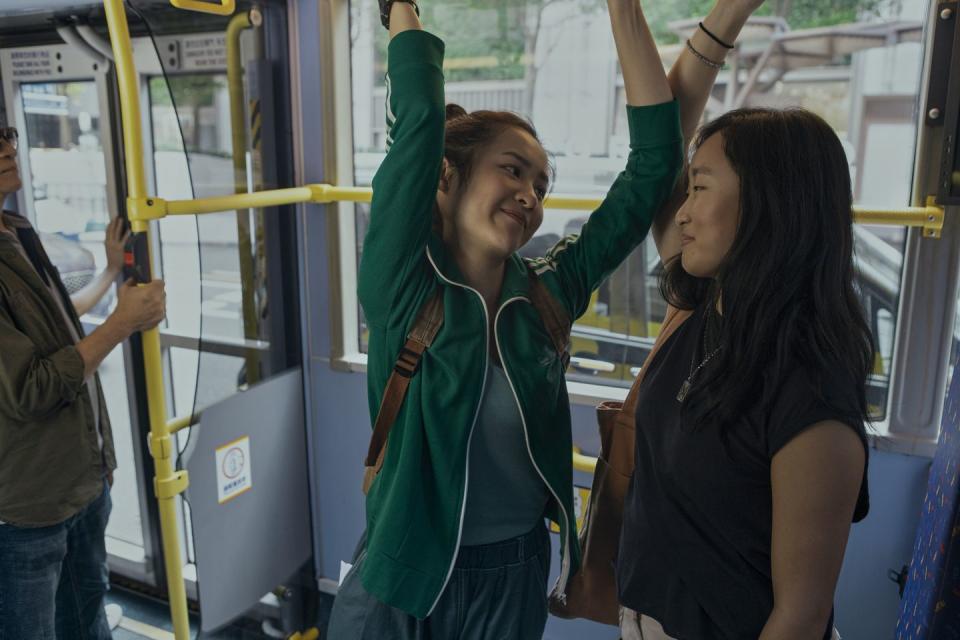
The finale also shows the three women meeting up to tell their sides of the story to each other for the first time, but only through close-ups and we don’t see them all sitting together. Why did you choose to film it this way to convey apologies, forgiveness, and closure?
These direct-to-camera conversations are like a visual voiceover; it’s a visual representation of a diary and there’s something so intimate about it. I wanted it to feel like they were talking directly to the audience. It felt like a way to engage the audience into their dynamics and into the things they were saying to each other—whether that was an apology, advice, or words of hope, it felt like the audience needed to connect directly to them. We’re also not always sure who’s saying what, to whom, and, in a way they could all be saying these things to each other.
Speaking of closure, I loved Margaret’s line to Mercy, “For so long I wanted to erase you and here you are adding to the world.” It’s a generous way for Margaret to forgive the person who has caused the most anguish in her life. Can you tell me about giving them this conclusion?
That line was from the book. Janice wrote so many beautiful phrases that I just couldn’t let go of and I felt like they had to be in the series. But I don’t interpret that one as forgiveness, I interpreted it just as a fact: She did want to erase her and she is adding to the world. What do you do with that? There’s something so graceful about that admittance from Margaret, even though it’s not a true forgiveness. I don’t know how she could ever truly forgive Mercy, but it also connects to Hilary saying that she doesn’t want to be angry anymore because that’s also not serving herself.
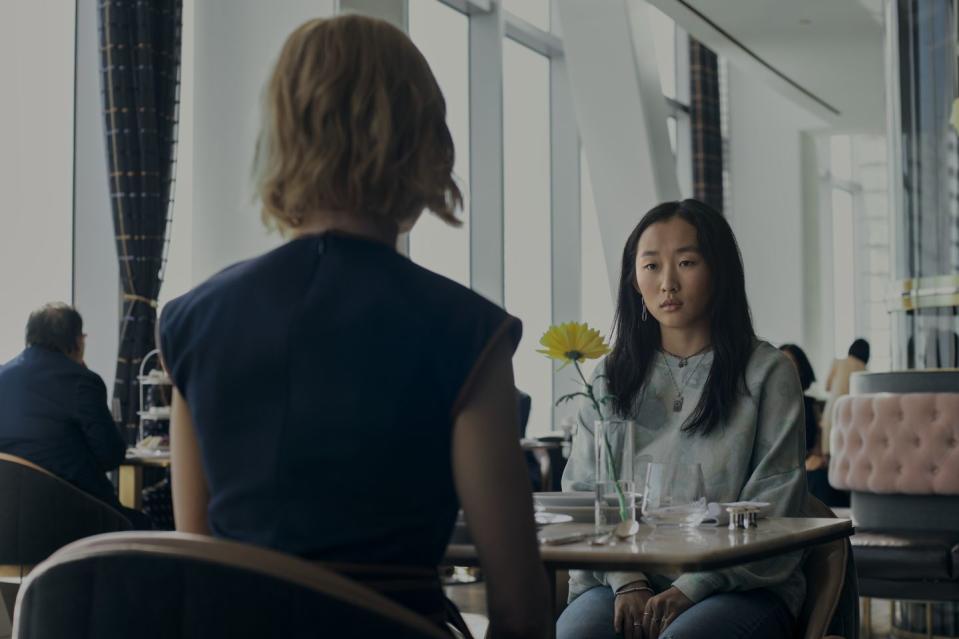
The biggest shock in the finale and another departure from the book is that Margaret decides to stay in Hong Kong, unable to get on the flight back to the U.S. with the rest of her family. Why did you choose this ending for her character?
It felt like a really poignant arc for Margaret because she is a person who is tremendously privileged; the entire reason for her being in Hong Kong was from a privileged stance. She has a particular lifestyle and benefits from the society and culture, but isn’t really an integral part of its world. In thinking about the difference between expats and immigrants, and the reasons why we leave home and why we sacrifice or don’t sacrifice as either one of these groups, I saw her having to transform from a place of privilege to being there by choice. She becomes, in a way, an immigrant because she has to sacrifice her whole family to be there in pursuit of something greater. It’s heartbreaking when she has to give up, but in many ways, that cuts her down to size because that’s something that so many people have to do—including [her housekeeper] Essie who’s had to give up her own family and in order to work for the Wu family in Hong Kong. Putting her in the city with the people for once felt like the right way to end it.
This interview has been edited and condensed.
You Might Also Like

